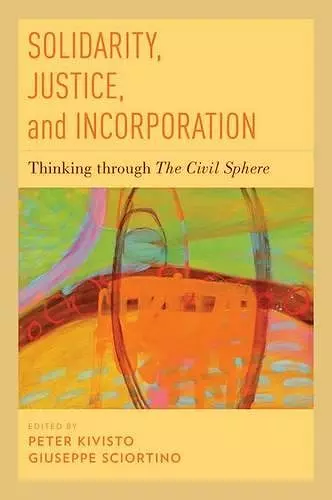Solidarity, Justice, and Incorporation
Thinking through The Civil Sphere
Peter Kivisto editor Giuseppe Sciortino editor
Format:Hardback
Publisher:Oxford University Press Inc
Published:21st May '15
Currently unavailable, and unfortunately no date known when it will be back

Although many contemporary scholars have deepened our understanding of civil society, a concept that made its entry into modern social thought in the 17th century, by offering insightful exegetical inquiries into the tradition of thinking about this concept, critiquing the limits of civil society discourse, or seeking to offer empirical analyses of existing civil societies, none have attempted anything as bold or original as Jeffrey C. Alexander's The Civil Sphere. While consciously building on this three centuries long tradition of thought on the subject, Alexander has broken new ground by articulating in considerable detail a theoretical framework that differs from what he sees as the two major perspectives that have heretofore shaped civil society discourse. In so doing, he has sought to construct from the bottom up a model of what he calls the civil sphere, which he treats in Durkheimian fashion as a new social fact. In this volume, six internationally recognized scholars comment on the civil sphere thesis. Robert Bellah, Bryan S. Turner, and Axel Honneth consider the work as a whole. Mario Diani, Chad Alan Goldberg, and Farhad Khosrokhavar offer analyses of specific aspects of the civil sphere. In their substantive introduction, Peter Kivisto and Giuseppe Sciortino locate the civil sphere thesis in terms of Alexander's larger theoretical arc as it has shifted from neofunctionalism to cultural sociology. Finally, Alexander's clarifies and further elaborates on the concept of the civil sphere.
Jeffrey Alexander's The Civil Sphere was an original and powerful book, exploring the cultural dimension of civil society, making explicit the normative grounding of his sociology and offering a distinctively American, non-statist understanding of multiculturalism. This book brings together some international leading theorists to explore as well as challenge Alexander's ideas in ways which illuminate the nature of social solidarity and what sociology can offer our fragmented societies. * Tariq Modood, Director, University of Bristol Research Centre for the Study of Ethnicity and Citizenship *
Jeffrey Alexander's The Civil Sphere brought a career of theoretical reflection to bear on some of the biggest challenges of our era. The book's scope and ambition made it challenging, but also offered an invitation to join Alexander in trying to advance both the theory and the reality of civic solidarity. In this new book, six of sociology's leading theorists take up the challenge, Alexander responds, and the debate about civil society and social solidarity is enriched. -Craig C. Calhoun, Director and President, London School of Economics and Political Science
This superb new volume of essays reminds us that social solidarities and popular participation are aspirational goals, not settled accomplishments, and have the potential for moral inclusiveness only in a third autonomous sphere of civil society. A consequential set of reflections on an enormously consequential work of original social theory that will serve as a touchstone of critical theory for the foreseeable future. * Margaret R. Somers, Professor of Sociology and History, University of Michigan *
ISBN: 9780199811908
Dimensions: 160mm x 236mm x 23mm
Weight: 425g
216 pages